 Real property partitions help co-owners and co-tenants divide real estate that they purchased together. Partition actions can be agreed upon by the parties, but if there is no agreement, a court will oversee the partition. Under California law, a court will first determine each party’s interest in the property and then determine the way the property will be partitioned. (Code Civ. Proc., § 872.720(a).) California Civil Code of Procedure section § 872.720(a) provides:
Real property partitions help co-owners and co-tenants divide real estate that they purchased together. Partition actions can be agreed upon by the parties, but if there is no agreement, a court will oversee the partition. Under California law, a court will first determine each party’s interest in the property and then determine the way the property will be partitioned. (Code Civ. Proc., § 872.720(a).) California Civil Code of Procedure section § 872.720(a) provides:
If the court finds that the plaintiff is entitled to partition, it shall make an interlocutory judgment that determines the interests of the parties in the property and orders the partition of the property and, unless it is to be later determined, the manner of partition. (Code Civ. Proc., § 872.720.)
Property partitions can be completed by dividing the physical property, by selling the property and dividing the amount of the sale among the interested parties, or by appraisal with all parties’ consent. In partitioning property through a sale without an agreement, courts may select a referee to assist in the sale. While courts presume that physical division of the properties is the fair option, a party wanting to sell the property can prove that it would be fairer to sell it than it would be to divide it. (Butte Creek Island Ranch v. Crim (1982) 136 Cal.App.3d 360, 366.)
 California Partition Law Blog
California Partition Law Blog


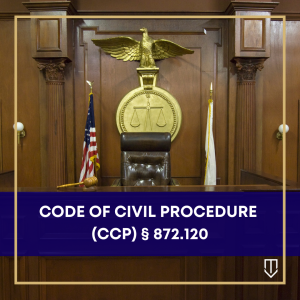 California Code of Civil Procedure section 872.130 expands the court’s authority in an effort to make the court system more efficient when ordering a
California Code of Civil Procedure section 872.130 expands the court’s authority in an effort to make the court system more efficient when ordering a 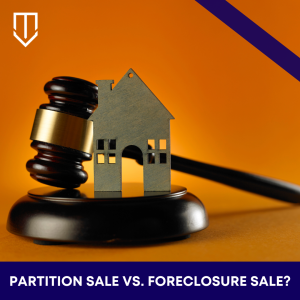 Partitions sales and foreclosure sales are two different ways that a property can be sold. The main difference between the two is the purpose behind the two sales. For partition sales, the purpose is to divide the property and for the owners to get the proceeds in proportion to their ownership. The purpose of foreclosure sales is to pay off a borrower’s loan.
Partitions sales and foreclosure sales are two different ways that a property can be sold. The main difference between the two is the purpose behind the two sales. For partition sales, the purpose is to divide the property and for the owners to get the proceeds in proportion to their ownership. The purpose of foreclosure sales is to pay off a borrower’s loan. 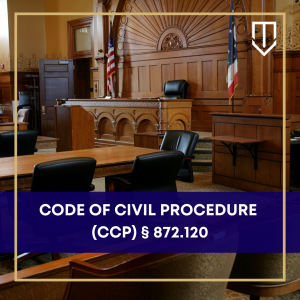 California Code of Civil Procedure section 872.120 grants the court continuing jurisdiction to hear all motions and issue any necessary decrees in order to fulfill the purpose of the partition title, which aims to provide the court with broad statutory authority.
California Code of Civil Procedure section 872.120 grants the court continuing jurisdiction to hear all motions and issue any necessary decrees in order to fulfill the purpose of the partition title, which aims to provide the court with broad statutory authority. 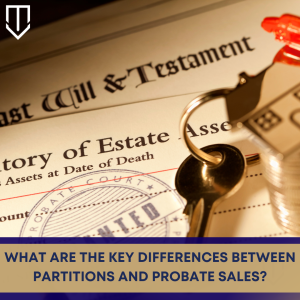 Partitions sales and probate sales are two different ways that a property can be sold. A main difference between the two is that a partition sale is ordered and overseen by the court, while a probate sale is generally overseen by a personal representative, and the court can have minimal involvement. There are also specific steps that the personal representative must take in the probate sale process under California law.
Partitions sales and probate sales are two different ways that a property can be sold. A main difference between the two is that a partition sale is ordered and overseen by the court, while a probate sale is generally overseen by a personal representative, and the court can have minimal involvement. There are also specific steps that the personal representative must take in the probate sale process under California law. 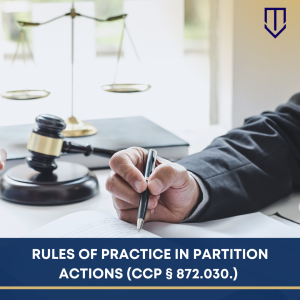 The California Code of Civil Procedure plays a pivotal role in shaping the legal landscape of civil actions. The
The California Code of Civil Procedure plays a pivotal role in shaping the legal landscape of civil actions. The 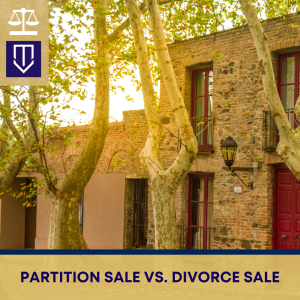 Partitions sales and divorce sales are two different ways that a property can be sold. One difference between the two is that in a partition sale, the court usually decides the proportion of ownership and how the proceeds are distributed among the owners, while in a divorce sale, the court generally must divide the property equally. Another difference is that the divorce sale process is similar to a normal real estate sale. Both sales can be determined informally among the parties or ordered by a court.
Partitions sales and divorce sales are two different ways that a property can be sold. One difference between the two is that in a partition sale, the court usually decides the proportion of ownership and how the proceeds are distributed among the owners, while in a divorce sale, the court generally must divide the property equally. Another difference is that the divorce sale process is similar to a normal real estate sale. Both sales can be determined informally among the parties or ordered by a court.  Partitions sales and trustee sales are two different ways that a property can be sold. A main difference between the two is that a partition sale is ordered and overseen by the court, while a trustee sale is overseen by a third party in relation to foreclosure proceedings. While the third party is not beholden to a court ruling in a trustee sale, they must still follow the procedures outlined in California law.
Partitions sales and trustee sales are two different ways that a property can be sold. A main difference between the two is that a partition sale is ordered and overseen by the court, while a trustee sale is overseen by a third party in relation to foreclosure proceedings. While the third party is not beholden to a court ruling in a trustee sale, they must still follow the procedures outlined in California law.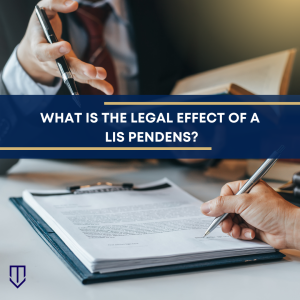 Lawsuits that affect interests in real property, such as partition actions, often require courts to adjudicate competing claims regarding who should have title to or possession of real property. In general, courts adjudicating such disputes follow the principle of “first in time, first in right.” Under this principle, “a conveyance recorded first generally has priority over any later-recorded conveyance.” (
Lawsuits that affect interests in real property, such as partition actions, often require courts to adjudicate competing claims regarding who should have title to or possession of real property. In general, courts adjudicating such disputes follow the principle of “first in time, first in right.” Under this principle, “a conveyance recorded first generally has priority over any later-recorded conveyance.” ( Generally, a co-owner of real property may commence an action in a partition. Owners of an estate of inheritance, a life estate, or an estate for years who hold such interest concurrently or in successive estates may seek to
Generally, a co-owner of real property may commence an action in a partition. Owners of an estate of inheritance, a life estate, or an estate for years who hold such interest concurrently or in successive estates may seek to